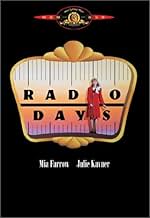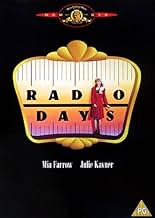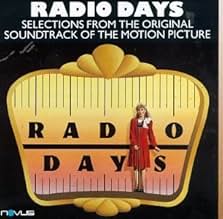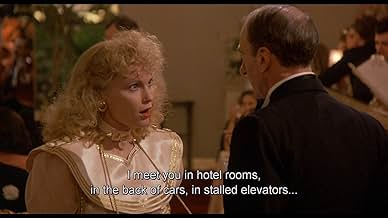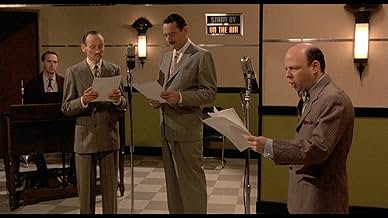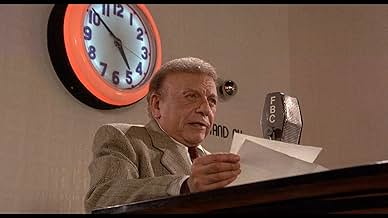A nostalgic look at radio's golden age focusing on one ordinary family and the various performers in the medium.A nostalgic look at radio's golden age focusing on one ordinary family and the various performers in the medium.A nostalgic look at radio's golden age focusing on one ordinary family and the various performers in the medium.
- Nominated for 2 Oscars
- 3 wins & 10 nominations total
Mick Murray
- Avenger Crook
- (as Michael Murray)
Renée Lippin
- Ceil
- (as Renee Lippin)
- Director
- Writer
- All cast & crew
- Production, box office & more at IMDbPro
Featured reviews
10bbbaldie
This movie shouts one word: WARMTH. The colors, the plot, the characters, they are all wonderfully warm.
I've watched this movie with senior citizens who were around in the forties. I once watched it with a Jewish guy who grew up on Long Island (albeit in the early 30's, not the 40's). All comments were the same: THIS was life in New York during wartime.
Vietnam was my war, so this era was a mystery to me. However, any time a genius like Woody Allen can create a film that not only makes me and my rowdy friends laugh, but gets guffaws from my dear old Mom as well, it deserves a little fanfare.
I didn't even mention the solid gold music.
See this film at once!
I've watched this movie with senior citizens who were around in the forties. I once watched it with a Jewish guy who grew up on Long Island (albeit in the early 30's, not the 40's). All comments were the same: THIS was life in New York during wartime.
Vietnam was my war, so this era was a mystery to me. However, any time a genius like Woody Allen can create a film that not only makes me and my rowdy friends laugh, but gets guffaws from my dear old Mom as well, it deserves a little fanfare.
I didn't even mention the solid gold music.
See this film at once!
If you are looking for the normal amount of big laughs from a Woody Allen film, then you will be disappointed here. It's not that kind of film.
I was anything but disappointed, but I knew what the film was all about before I saw it. Actually, what drew me to it was that I had read where this was a wonderful visual film, filled with rich colors and great set designs. It did not let me down. This is a great visual tribute to the 1940s, to be exact from 1938 to 1944. A real treat for the eyes.
The story centers around a Jewish family in Queens and the importance that radio shows had in that day-and-age. Also profiled in here are some of those radio performers.
It does have laughs but not as many as the normal Allen movie because the idea of this is simply to be a nostalgic piece, mainly Allen's tribute to his own family days of growing up, what it was like around his house.
It was interesting to see Seth Green playing Woody as a youngster with flaming red hair. The most interesting person, however, was Diane Wiest who played a man-chasing sister-in-law. The film gives you a real flavor of the period, of New York and of a Jewish family.
Overall, it's simply a nice film....and gorgeous to look at. Sometimes I think some of Allen's work is overrated but, boy, here is one that is definitely underrated.
I was anything but disappointed, but I knew what the film was all about before I saw it. Actually, what drew me to it was that I had read where this was a wonderful visual film, filled with rich colors and great set designs. It did not let me down. This is a great visual tribute to the 1940s, to be exact from 1938 to 1944. A real treat for the eyes.
The story centers around a Jewish family in Queens and the importance that radio shows had in that day-and-age. Also profiled in here are some of those radio performers.
It does have laughs but not as many as the normal Allen movie because the idea of this is simply to be a nostalgic piece, mainly Allen's tribute to his own family days of growing up, what it was like around his house.
It was interesting to see Seth Green playing Woody as a youngster with flaming red hair. The most interesting person, however, was Diane Wiest who played a man-chasing sister-in-law. The film gives you a real flavor of the period, of New York and of a Jewish family.
Overall, it's simply a nice film....and gorgeous to look at. Sometimes I think some of Allen's work is overrated but, boy, here is one that is definitely underrated.
In my opinion, Radio Days is right up there with Annie Hall though it's different in that it's following several people's lives. Woody doesn't act in this, but his narration is excellent.
He takes the wonderful old songs and commercials from that time and weaves them into the story. I was completely captivated.
It's not a "laugh a minute" type film, but it also gets you thinking. Nevertheless, it has some hilarious scenes. Check out the Jewish fasting holiday scene. I've watched it at least 6 times and I still laugh. Also the scene with Mia Farrow's character was superb. One of my favorite lines is when she tells a top radio producer in her high-pitched nasal voice, "Jeez. We can't keep meeting like this. In the backs of cars, movie theaters and stalled elevators. You're gonna lose your respect for me!" I love this film.
He takes the wonderful old songs and commercials from that time and weaves them into the story. I was completely captivated.
It's not a "laugh a minute" type film, but it also gets you thinking. Nevertheless, it has some hilarious scenes. Check out the Jewish fasting holiday scene. I've watched it at least 6 times and I still laugh. Also the scene with Mia Farrow's character was superb. One of my favorite lines is when she tells a top radio producer in her high-pitched nasal voice, "Jeez. We can't keep meeting like this. In the backs of cars, movie theaters and stalled elevators. You're gonna lose your respect for me!" I love this film.
This is a wonderful wonderful movie that exemplifies the phrase, "misty watercolored memories." It is a joy to watch and listen to. The era before and during WWII, however, was anything but wonderful. Radio Days presents a time when America was dealing with the Great Depression and its after effects and the horrible event that was World War II. Since the man narrating the memories was only a boy then, it is altogether fitting and proper that he see things as a child; for as he states in one scene, "our conversation turned from Nazis to more important things,like girls." No movies, except this one, that I recall, are able to deal with this critical age in American history without conveying the tragic time that it was.
I would like to think this family was really Woody Allen's, but it is probably a work of fiction, like his other pieces. But how tremendous that he can create (or remember) these people. As I watched it, one thought that kept recurring was that these were not "beautiful" manufactured people like we see in the media today; they had big hips and were fat and poor and... and none of that mattered. They were real. They were believable. You can't watch this movie without wondering what happened to them, did Aunt Bee find a husband? You cared about this family and personally, I wished they were mine.
The vignettes were sad and sweet. My favorite was poor departed Kirby Kyle; at least he had heart! And Leonard; and "donations for the promotion of a state in Palestine." So many memories that make us a part of a family most people never had. The viewer belongs to this warm and loving group.
Something has been lost with the concept of "nuclear family," with the lonely big houses and empty hours and unshared hopes and sorrows. Radio Days reminds us that having someone to experience life with is a treasure and a blessing, despite whacks on the head, martians, and fish, "That man always brings home fish!"
And oh, the music!
This is Woody Allen's masterpiece.
I would like to think this family was really Woody Allen's, but it is probably a work of fiction, like his other pieces. But how tremendous that he can create (or remember) these people. As I watched it, one thought that kept recurring was that these were not "beautiful" manufactured people like we see in the media today; they had big hips and were fat and poor and... and none of that mattered. They were real. They were believable. You can't watch this movie without wondering what happened to them, did Aunt Bee find a husband? You cared about this family and personally, I wished they were mine.
The vignettes were sad and sweet. My favorite was poor departed Kirby Kyle; at least he had heart! And Leonard; and "donations for the promotion of a state in Palestine." So many memories that make us a part of a family most people never had. The viewer belongs to this warm and loving group.
Something has been lost with the concept of "nuclear family," with the lonely big houses and empty hours and unshared hopes and sorrows. Radio Days reminds us that having someone to experience life with is a treasure and a blessing, despite whacks on the head, martians, and fish, "That man always brings home fish!"
And oh, the music!
This is Woody Allen's masterpiece.
Radio Days (1987) was written and directed by Woody Allen. The movie is set during the "golden years of radio," when radio programs, listened to at home, were an important aspect of American entertainment.
The film is narrated by Woody Allen, and is a nostalgic--and possibly autobiographical--look at the childhood of a young boy growing up in Rockaway, Queens. Allen grew up in Brooklyn, but the culture and customs of lower-middle class Jews in Rockaway would have been similar to those that Allen probably witnessed in Brooklyn.
The movie is set in the late 1930's and early 1940's. Surprisingly, World War II doesn't hold a prominent place in the film. Although the war was thousands of miles away, no aspect of life in the U.S. was untouched by it. Allen chose to concentrate on other matters--failed hopes, unfulfilled romances, and family bickering.
Despite these negative aspects of day-to-day life, the film projects a cheery, upbeat attitude. After all, it was a time when someone who looked like Wallace Shawm could star as radio's "Masked Avenger." Woody's subdued narrative lets us know that he loved those around him and was loved by them in turn.
Life wasn't perfect, but it could have been worse, and who knew what good things the future might bring.
We saw Radio Days on DVD. It probably would work somewhat better on the large screen, but it's worth seeking out and seeing in any format.
The film is narrated by Woody Allen, and is a nostalgic--and possibly autobiographical--look at the childhood of a young boy growing up in Rockaway, Queens. Allen grew up in Brooklyn, but the culture and customs of lower-middle class Jews in Rockaway would have been similar to those that Allen probably witnessed in Brooklyn.
The movie is set in the late 1930's and early 1940's. Surprisingly, World War II doesn't hold a prominent place in the film. Although the war was thousands of miles away, no aspect of life in the U.S. was untouched by it. Allen chose to concentrate on other matters--failed hopes, unfulfilled romances, and family bickering.
Despite these negative aspects of day-to-day life, the film projects a cheery, upbeat attitude. After all, it was a time when someone who looked like Wallace Shawm could star as radio's "Masked Avenger." Woody's subdued narrative lets us know that he loved those around him and was loved by them in turn.
Life wasn't perfect, but it could have been worse, and who knew what good things the future might bring.
We saw Radio Days on DVD. It probably would work somewhat better on the large screen, but it's worth seeking out and seeing in any format.
Discover the nominees, explore red carpet fashion, and cast your ballot!
Did you know
- TriviaThe story of Kirby Kyle, the ill-fated baseball player, is a parody of former Chicago White Sox pitcher Monty Stratton, whose promising career was derailed after he lost part of his leg due to a hunting accident. Stratton attempted a comeback and then retired. His life was made into a movie: The Stratton Story (1949).
- GoofsIn one scene, a pack of Camel cigarettes lies on a table, with a clearly visible bar code on the side of the package. The Universal Product Code would not be introduced until the 1970s.
- Quotes
[Last lines]
Narrator: I never forgot that New Year's Eve when Aunt Bea awakened me to watch 1944 come in. I've never forgotten any of those people or any of the voices we would hear on the radio. Though the truth is, with the passing of each New Year's Eve, those voices do seem to grow dimmer and dimmer.
- SoundtracksThe Flight of the Bumblebee
(1899-1900)
Music by Nikolai Rimsky-Korsakov
Performed by Harry James
Courtesy of CBS Records
Played during the opening credits
Details
- Release date
- Country of origin
- Official site
- Languages
- Also known as
- Días de radio
- Filming locations
- Radio City Music Hall - 1260 6th Avenue, Rockefeller Center, Manhattan, New York City, New York, USA(Joe, his Aunt Bea and her date see a movie there)
- Production companies
- See more company credits at IMDbPro
Box office
- Budget
- $16,000,000 (estimated)
- Gross US & Canada
- $14,792,779
- Opening weekend US & Canada
- $1,522,423
- Feb 1, 1987
- Gross worldwide
- $14,792,779
Contribute to this page
Suggest an edit or add missing content



